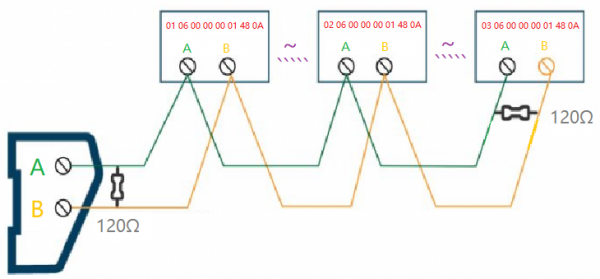TTL TO RS422 (B)
| ||
| ||
Overview
TTL TO RS422 (B) is an industrial-grade rail-mounted electrically isolated TTL-to-RS485 serial converter.
Feature
- Compatible with TTL/RS485 standard, converting the TTL signal into a balanced differential RS485 signal, supporting full-duplex communication.
- Compatible with 3.3V ~ 5V TTL signal level, with anti-reverse connection and anti-over-voltage circuit on the power supply side.
- Onboard unibody power supply isolation, provides stable isolated voltage and needs no extra power supply for the isolated terminal.
- Onboard unibody digital isolation, allows signal isolation, high reliability, strong anti-interference, and low power consumption.
- Onboard TVS (Transient Voltage Suppressor), effectively suppresses surge voltage and transient spike voltage in the circuit and is anti-electrostatic.
- Onboard resettable fuse and protection diodes, ensure the current/voltage stable outputs, provide over-current/over-voltage protection, and improve shock resistance.
- On-board RS485 input and output 120R resistors with built-in jumper caps for switching enable.
- Industrial rail-mount ABS case design, small in size, easy to install, and cost-effective.
Parameters
| Model | Galvanic isolated TTL to RS422 converter | |
|---|---|---|
| Power Port | Power Supply | 3.3V ~ 5V |
| Interface Protection | anti-over-discharge, reverse-proof | |
| Device Interface | Compatible with TTL / RS485 standard | |
| TTL Interface | Interface Type | Screw terminal |
| Transmission Distance | less than 10m | |
| Transmission Model | Point to point | |
| RS422 Interface | Interface type | Screw terminal |
| Interface Protection | Provide 600W lightningproof, surge-suppress and 15KV ESD protection | |
| Terminal Resistance | 120R, enabled/disabled via jumper (inside the case) | |
| Transmission Distance | About 1200m | |
| Transmission Mode | Point-to-multipoint (Up to 32 nodes can be connected, and relays are recommended for more than 16 nodes) | |
| Product Appearance | Case | Rail-mount ABS case, suitable for 35mm DIN rail |
| Dimensions | 91.6 × 58.7 × 23.3mm | |
Basic Function
Convert TTL signal to balanced differential RS422 signal, which can be used for interface conversion, and node expansion, and can also be used to extend the communication distance.

Interface Introduction
Communication Connection Diagram
TTL convert to RS422, point to point, full duplex communication, suitable for interface conversion
TTL convert to RS422, point-to-multipoint, full duplex communication, suitable for expanding nodes
Two groups TTL to RS422 conversion, point-to-point, full duplex communication, suitable for extending the communication distance of TTL
Dimensions
Hardware Test
Test Note
Test Environment: PC (Windows).
Accessories required for testing:
- TTL TO RS422 (B) --this product
- USB TO TTL - not included
- USB TO RS485/RS422 - not included
Test Hardware Connection
Connect the RS422 interface of TTL TO RS422 (B) to the PC with the USB to RS422 conversion cable. Connect the TTL interface of TTL TO RS422 (B) to the TTL interface of USB TO TTL, and then connect the USB port of USB TO TTL to the same PC for the self-transmission tests. The schematic diagram of the hardware connection is as follows:

Note: The RS422 interface of this product also has two built-in 120R enabling resistors, which are enabled by default. Users can remove the case to modify the settings according to their needs. If signal isolation is required, GND can also be connected to the ground wire.
On the PC, open two SSCOM serial port debugging assistants, open the corresponding port number, set the same baud rate, and click Send at regular intervals to send and receive normally. The screenshot of the software test is as follows:

Resource
Software
FAQ
-15~70°C
{{{5}}}
We have tested 921600bps and it can work stably.
The hardware itself has no special limitations to the use of rate but mainly depends on the access to the TTL and RS422 devices, as well as the communication environment and communication distance.
{{{5}}}
- The module only provides a physical layer pure hardware level converter, without the need to configure parameters such as baud rate and nodes. Modbus communication requires implementation at the protocol layer.
- It supports the connection of Modbus devices (Modbus sensors, instruments, etc.). Understanding the Modbus protocol involves knowledge of Modbus function codes and data formats. Modbus has multiple function codes, with each code corresponding to a specific operation, such as reading coil status, reading input status, reading holding registers, etc.
{{{5}}}
- In general, the short-distance communication can be removed from RS422/RS485's two 120Ω terminal, and connect jumper caps to NC.
- When multiple devices connect to the RS485 serial bus over a long distance, in general, we add 120Ω matching resistors to the first and last devices on the RS485 bus.
{{{5}}}
The power consumption of this 5V is 0.12W.
{{{5}}}
Support
Technical Support
If you need technical support or have any feedback/review, please click the Submit Now button to submit a ticket, Our support team will check and reply to you within 1 to 2 working days. Please be patient as we make every effort to help you to resolve the issue.
Working Time: 9 AM - 6 PM GMT+8 (Monday to Friday)









